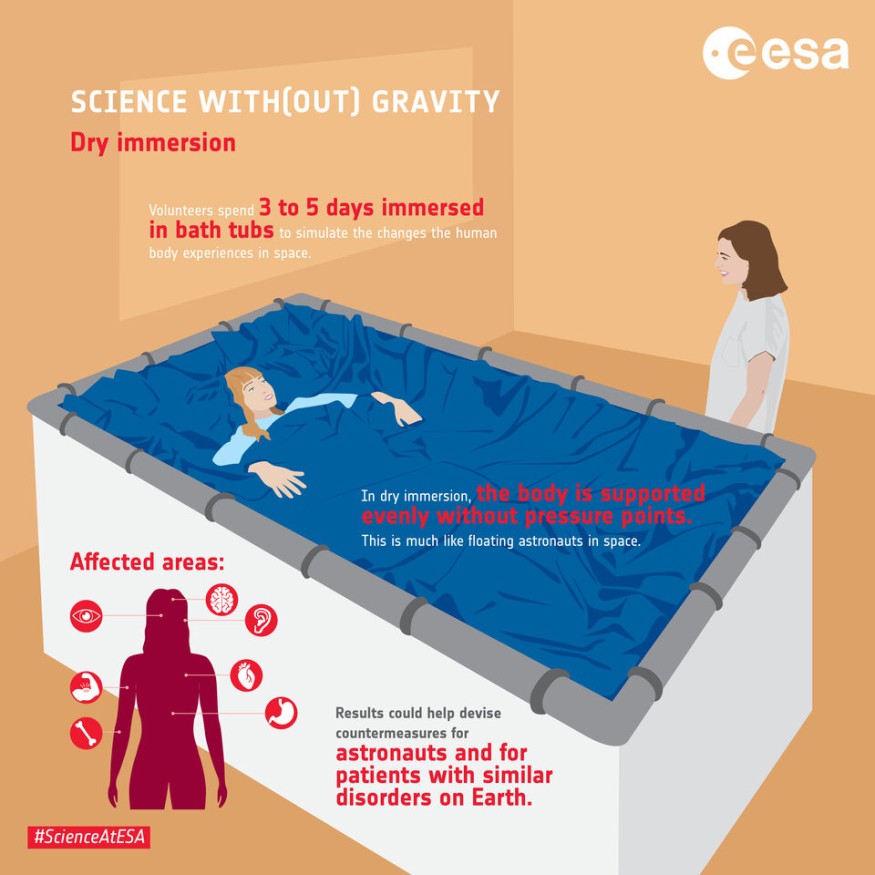As part of a trial at the Medes space clinic in Toulouse, France, a group of 20 female volunteers will spend five days in bed. The goal is to use a dry immersion method to explore the effects of microgravity on the body.
Water is one of the finest methods to replicate the weightlessness of space on Earth. That's why astronauts practice spacewalks in what amounts to a massive swimming pool. On the other hand, volunteers are unable to stay in the water for lengthy periods to see the impacts on their bodies over days rather than hours.
Effects of Microgravity on Humans
Microgravity has various impacts on the body, Digital Trends said. One may experience muscular atrophy. That's when a person's muscles don't have to work as hard to keep them upright. Some experience fluid redistribution when fluid pools in the upper half of the body. It's also vital to understand the psychological impact of little mobility in boring situations.
The weightlessness that astronauts endure can have dramatic consequences on the body quickly, reports said. Because there is no gravity to stress the spine, water and other molecules can migrate into the discs between the vertebrae, causing astronauts to grow taller in space and weaker, as supporting muscles and ligaments perform less work.
Fluids move towards the head when gravity is absent, related to hearing and visual issues. Previous research has revealed that the immune system might "go silent in the sterile atmosphere," allowing ancient infections to resurface. Many of these impacts are expected to be different for men and women.

ALSO READ : NASA Splits Human Exploration Into Two Departments to Better Improve on Future Space Flights
However, like with other space medical research, most of the studies related to this experiment have been done on males. With the growing number of women participating in spaceflight (per Digital Trends), more detailed research on their experiences is needed.
Dry Immersion Study
A sophisticated water bed is used in dry immersion research. The volunteers are lying in large baths with waterproof cloth covering the water. They aren't in direct contact with the water this way, but it nevertheless similarly sustains their bodies to what astronauts experience when they leave Earth's gravity. They are confined to the water bed for about 24 hours a day. Still, they will be able to wash and clean themselves while laying on their backs and tilting their heads 6 degrees down to reduce fluid shifts.
Futurism said the women are completely submerged in the tank, with the water just coming up to their necks. Their legs and torsos will be restrained entirely, but their arms and heads will be able to move about above the cloth.
Angelique Van Ombergen noted in a statement obtained by Phys.org that there is virtually little understanding regarding the physiological and psychological consequences on women in this study field. She claims that all-female dry immersion research will complement earlier male efforts in Europe and Russia.
This discovery might benefit individuals on Earth and researchers who want to learn more about what the body goes through in microgravity. The findings may help researchers better understand the psychological and physical requirements of individuals with mobility problems and those who are immobile or elderly.
Check out more news and information on Space in Science Times.












